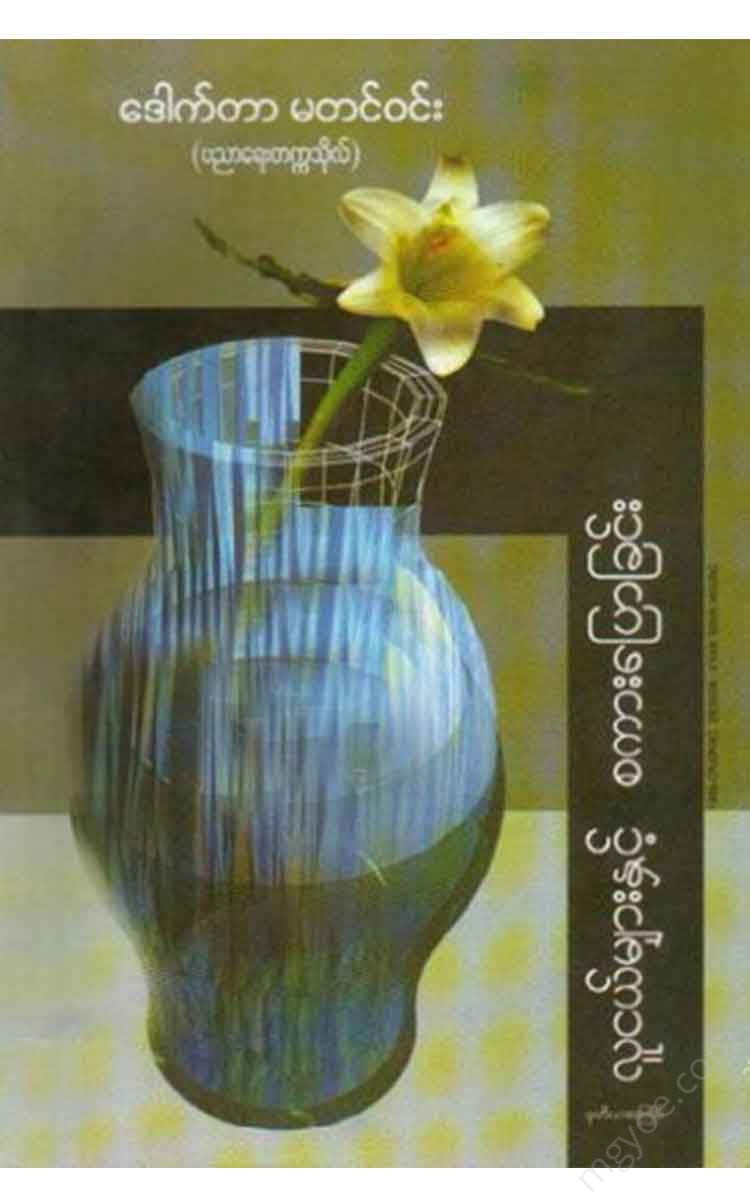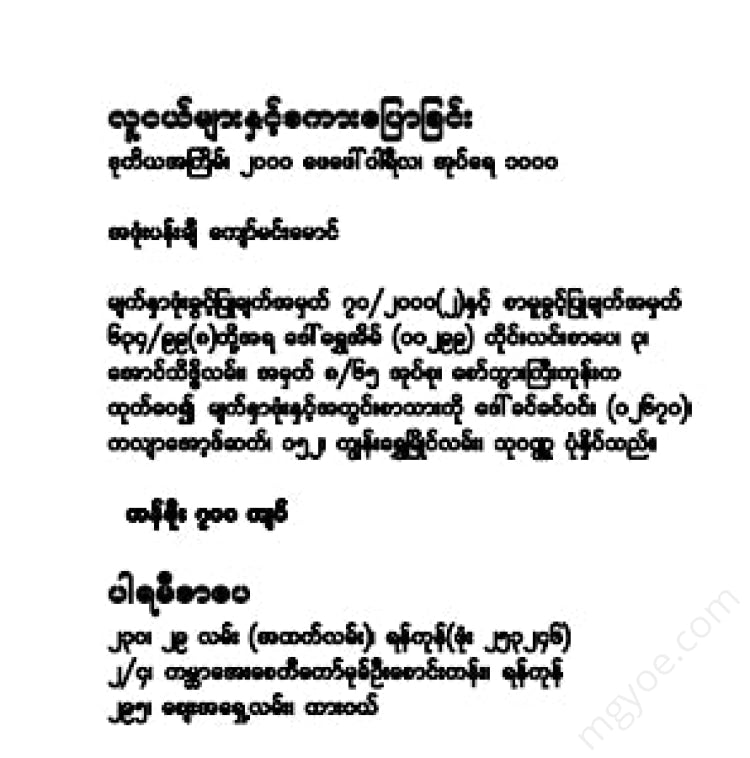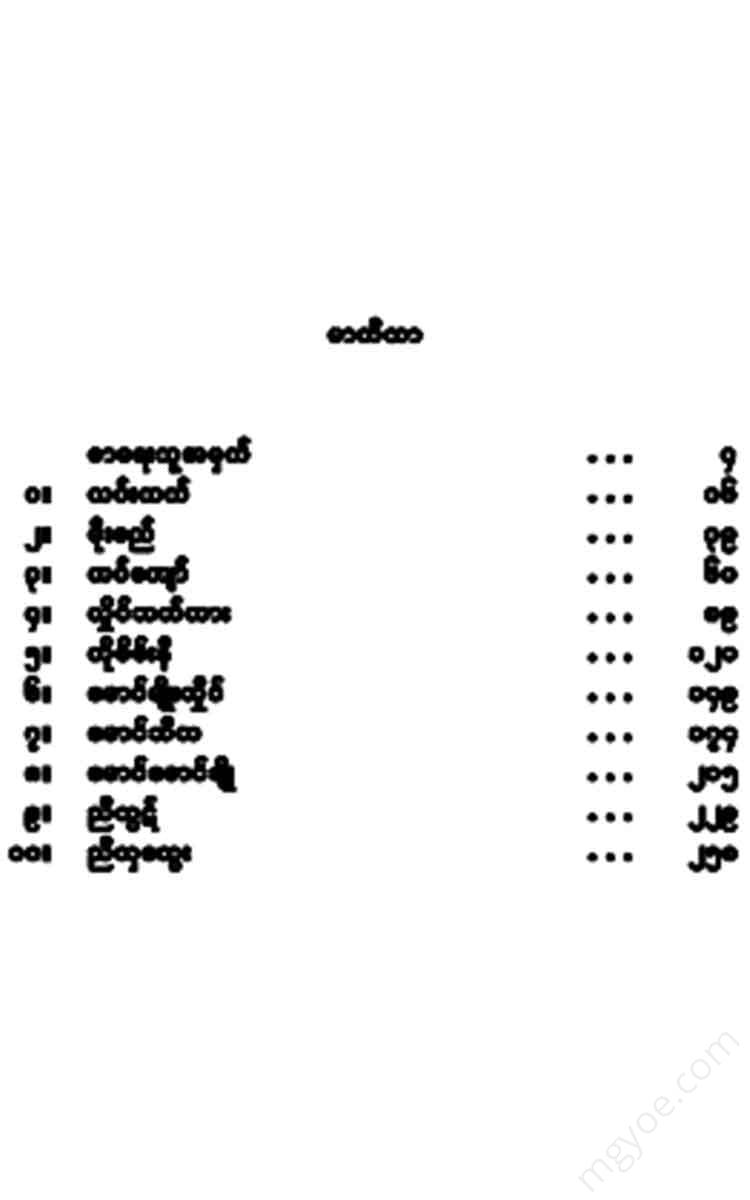Other Websites
Dr. Tin Win - Talking to the Youth
Dr. Tin Win - Talking to the Youth
Couldn't load pickup availability
:: Click on Buy it now to download the ebook . After placing your free order, the download link will be sent to the reader's email address used to log in to the mgyoe.com website.
:: The Ebook (Free) books on mgyoe.com are books that have been circulating on the internet for a long time.
:: It is just a compilation so that readers can easily find it when they want to read it.
:: If reprinted by libraries, the download links for these e-books will be removed.
------------------------------------
Author's note
I really like speaking work.
This is also natural.
Because I have been teaching literature for over 30 years and I am a woman. I am also an adult. So, if I like speaking, I will be able to enjoy my life.
There's one thing. When I talk, I don't say things that don't have a purpose. I try to talk with a purpose. I avoid people who talk without a purpose.
When I speak, I also speak to people who are older, wiser, and more knowledgeable than me. I also respect and obey what those people say.
I also enjoy talking to people who are willing to share their wisdom, especially young people. The feeling I get when I listen to elders respectfully is not the same as when I listen to elders respectfully. When I talk to elders, I feel a sense of calmness and peace because of their words and virtues.
When I talk to young people, I feel more open and free. I am often influenced by their creative spirit, their innovative spirit, their forward-looking and joyful spirit.
It's easy to copy such feelings. Because no matter how old you are, you always see yourself as if you were yesterday. In other words, you only get to where you are after overcoming the obstacles of your childhood, so it's not difficult for me to understand young people and feel with them.
I have been thinking about talking to young people for a long time. I have been trying to talk to them whenever I have the time and opportunity. The idea of writing a letter or a collection of poems came a little later.
When speaking to young people, I speak from a place of love for them and a sense of empathy (which can also be called empathy) for what they are going through.
As a woman who loves young people, I can't help but feel excited and happy after talking to them. Young people share their pain. Since I am a mother, some of them cry and express their pain. I tend to show them understanding and compassion rather than encouraging them. Their children often feel relieved at that time. When they return, I often feel unwell due to my age and health conditions. In this way, after almost a year, I have finished writing the draft of my book titled "Talking to Young People".
After talking to the youth in general, I would like to introduce the youth who wrote a letter or a poem. The youth who did not write every time we spoke were not left out because they were not good enough. Some of them spoke only once because they did not have time, and some of them were very good and said very good things, but they did not write them because they did not have time.
So I want to talk about the people who wrote it. The order in the book is according to the order in which the conversation took place. Some people say to put the names in the original form. But for the sake of context, I changed the names.
My conversation with Lin Htet started when I invited Lin Htet to talk to me about a job. I love young people but have little contact with them, so I invited her to talk about her interests.
When Linh Htet said that I was also trying to say something, I felt a sense of not only Linh Htet's short life but also the conditions in the education field that Linh Htet was living in. In addition, I respect Linh Htet's attitude, where if you have a goal and try hard, you will not be disappointed when things don't go as you expected, but you will continue to work hard and do what you have to do. I respect Linh Htet's resilience.
Because Linh Htet is different from those who sit back and talk when they can't do what they want to do. Not to mention young people, even adults, when they can't do what they want to do, they give up and don't do what they should do. We often see people around us who don't want to admit that they are giving up and spend their time talking about others. I believe that Linh Htet, who is working hard to do what she can, is someone who can create a better environment by changing the environment.
My conversation with Po Si was one-on-one. My conversation with Moe Si was in the same direction. Moe Si, a brilliant and talented young engineer, was so full of ambition that he couldn’t find himself. I could understand and sympathize with him. Because when I was young, I also couldn’t find myself with any ambition, and I was very unhappy in a hostile environment with my closest environment. That’s why I was talking to Moe Si to help him. To help him find himself.
I heard that Moe Sita is currently meditating and searching for herself. When her parents thanked her, I replied that my foundation is wisdom. No, not power, but understanding and compassion, which makes everything possible.
Tin Kyaw is not someone I can talk to. He is someone who speaks his mind freely. He is not only successful in his career but also a person who has found himself well. It is encouraging to hear such a young man speak.
In Than Kyaw's words, it is evident that young people who have gone astray due to various reasons can be encouraged to break the cycle of addiction if they can control their minds.
When I think back to the words of the wise, I am reminded of a poem written in English by the venerable Sayadaw U Zaw Ti, who was a great speaker. The poem is: I here derive power, but I make my honesty my divine power.
In Burmese, it means, “I don’t have any power. But I have made my honesty my power.” He is a man who is honest enough to be admired. He is so honest because after practicing meditation, he can correct his past mistakes without leaving any trace. I believe that he was able to overcome his past mistakes and openly admit them because of his power of honesty.
Hlaing Thet Tha is a girl in my book, a strong woman. Honest, hardworking. With great ambition. But she was still young, living in a still young environment, and had forgotten her basic values and work. She understood the meaning of writing well and was not good at it. She did not retake exams. She could also do other jobs, including writing. I told her that if someone really understood literature, there was no point in getting high marks. And I would like to say that an excellent person is not only someone who is excellent in their main job but also someone who can do other jobs.
Hlaing is now a medical student with good grades and is actively involved in literary work. He also comes to me when he can't find a solution to his many problems and difficulties in life.
Many difficulties are like a trap. I read a very difficult Buddhist book and called him with regrets that I didn't know what he was talking about. A difficulty is only a difficulty if you can't get out.
Young people are like that. They do good work and feel discouraged. All they need is a word or two. It means a few words of understanding and compassion.
The reason I wanted to talk to Ko Seinni was partly because he was not just a casual reader of my books, but a reader who read them with great respect and even bought them and kept them, and partly because his work is not directly related to literature.
When I talk to Ko Sein Ni, I see the beauty of families in Myanmar. Ko Sein Ni, who is of marriageable age but is a little hesitant about getting married because he fears leaving his family behind, is a successful carpenter. He still has a bright future ahead of him. There is only one thing. As a person who is in a general state of confusion, I can only pray that he finds a way to live his own life without losing it.
Maung Myo Hlaing is a unique character in this book because he is the one who insists on talking without me inviting him to talk.
I am about to enter middle age. I am afraid that I will not be included in the work of others, so I am not satisfied with the child's heart. The life he has lived is very rich, and his memory is good and his words are rich, so the stories he tells are interesting to note. 6. I only want to pray for one thing. When he was a primary school teacher, he was sentenced to a shoe trial and the shoemaker died, so I pray that he will not regret the journey he has to take with a precious pair of shoes.
Those who have big ideas and ask for advice often end up in the middle. Maung Myo Hlaing's young life experience proves this.
When Maung Thiha first spoke to me, I was a complete stranger. It was very moving to see a child I didn't know take the time to talk about himself. Now, I have become very attached to this child, whom we call our sister.
If you read about Maung Thiha, you will know. 6 Talay is not open, he often says that he does not want to share his feelings with anyone. When I talk about him, I understand why he says this. I came to love this boy because of his habits that I did not know when I talked to him but later learned. These habits are those that do not expect the benefit of others. If you think that you are right, you will firmly refuse any expectations. In short, Maung Thiha is a boy who is consistent with the name I gave him.
I want to warn young people like him not to make the wrong choice. Because I learned that he was suffering because he was loving, trusting, and didn't openly express his pain (because he usually did).
Maung Maung Cho is a young man who has lived a bitter life. Everyone who reads about him is filled with joy. That's why I named him Maung Maung Cho. I want to leave him alone and not bitter.
Maung Maung Cho was lucky to meet me. Even though I am an adult, I am a person who can change his mind and tell myself that he is not a child anymore. I treated him with compassion and kindness, but I could not bear to be separated from the child who had never been fully treated. I was the one who gave Maung Maung another bitter experience. It was because of sugar. Maung Maung Cho felt the bitter taste of sugar. Therefore, I pray that Maung Maung will be able to achieve his goal without any problems.
I won't mention much about Nyi Htut, as he is well known. However, I was pleased that he was able to quickly reveal his inner artistic qualities, which are not yet widely known, when he spoke to me.
I can confidently say that Nyi Htut is a young man who will continue to improve because he is only competing with himself.
Whenever I talk about Nyi Htut the dog, I feel so sorry for his beloved mother. He was a sweet, sweet child who became a drug addict and a homeless person, but he represents every child in a family that is not visible from the outside but has a big crack inside. Writing about him is a reminder to young people who want to venture abroad. And I also want adults to know that children can be damaged if they are beautiful on the outside but have a family relationship on the inside.
I think it's a good thing because I talk to young people. Young people are not as weak as some adults think. They are not weak, they are energetic and talented.





